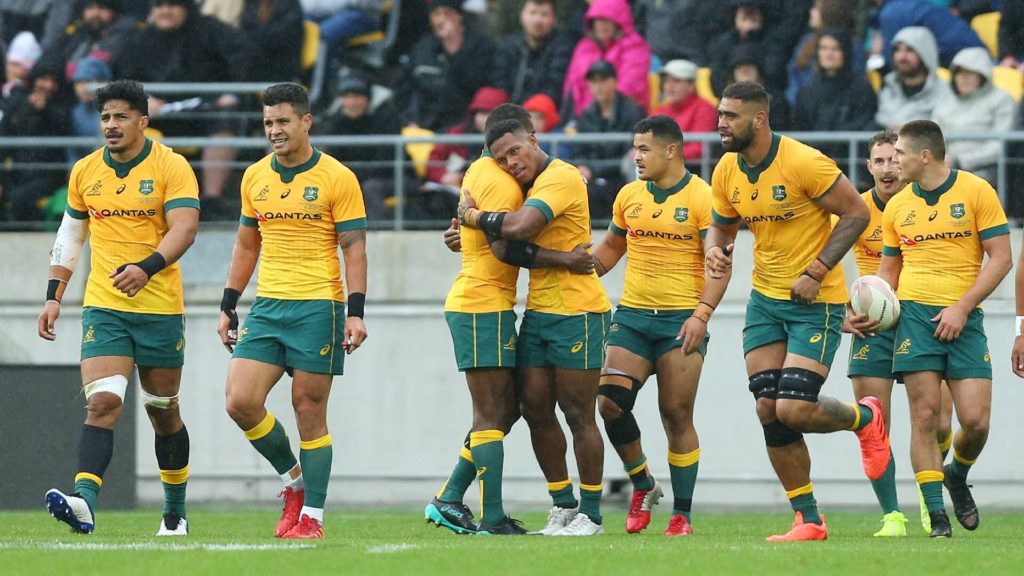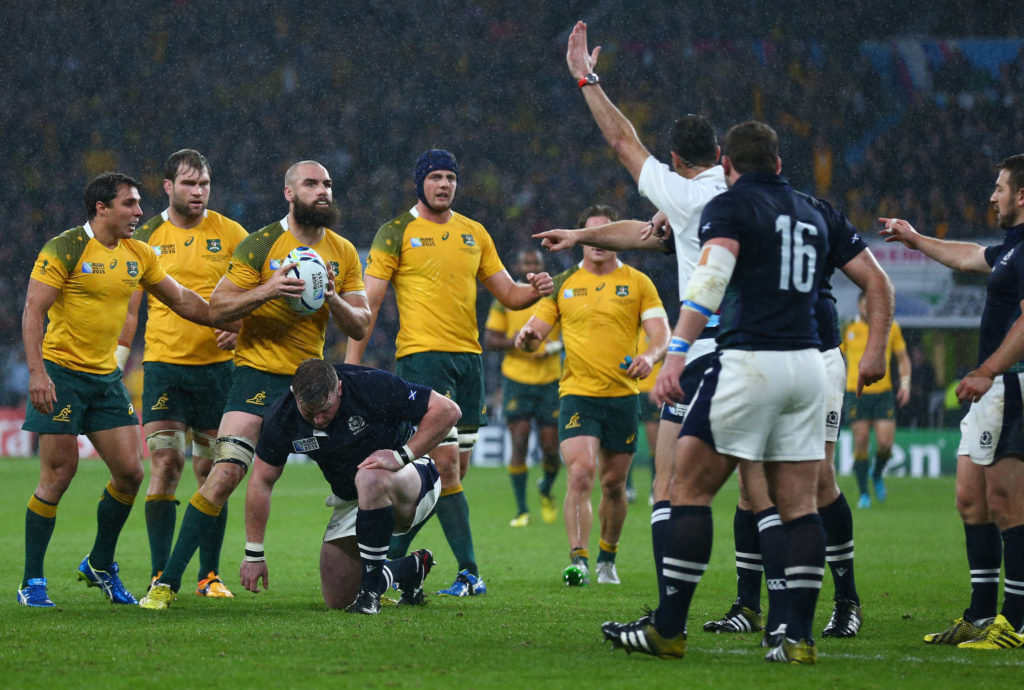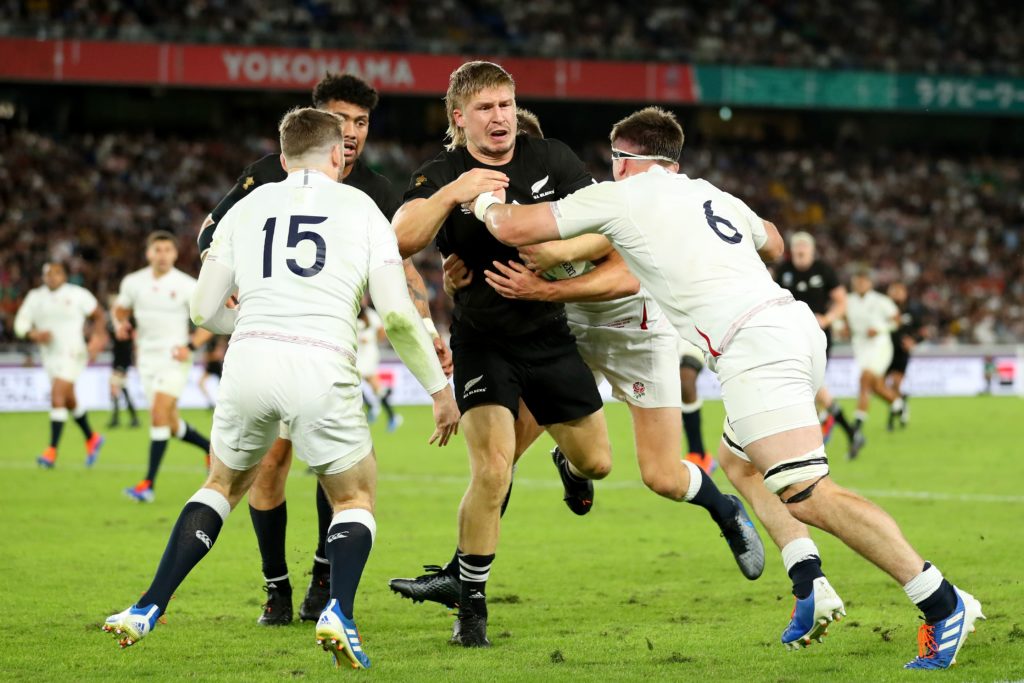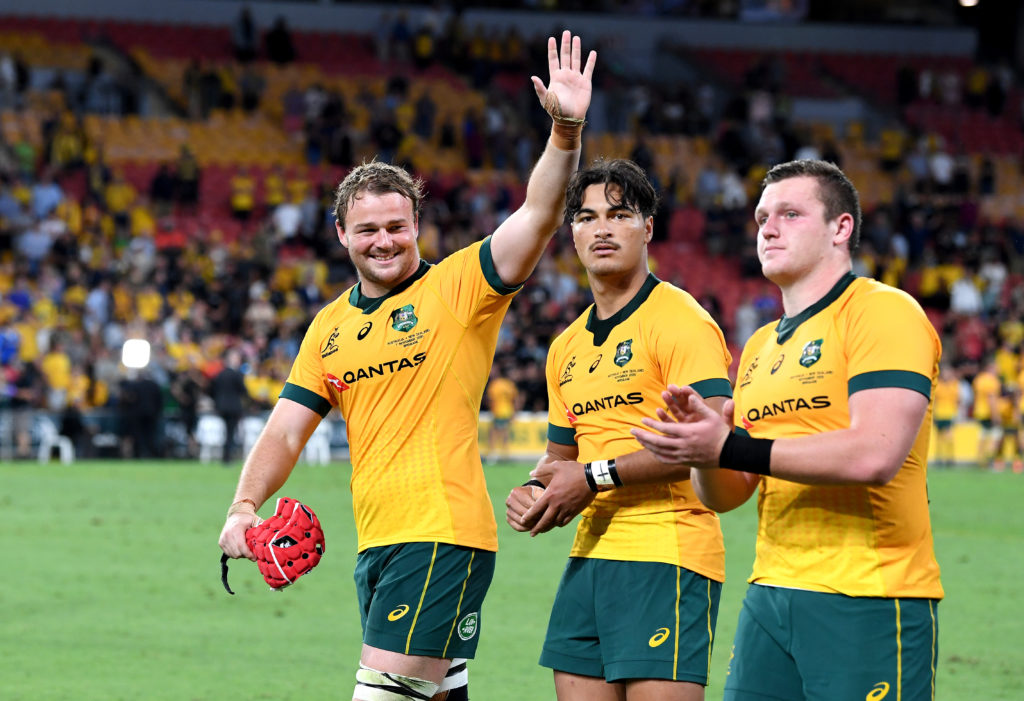Rugby Australia might well be “leaner, more efficient and ready for 2021”, but until the Wallabies start winning – and winning consistently – the game will, as Foxtel boss Patrick Delaney put it, remain a “second tier” sport.
Indeed, as the French writer Jean-Baptiste Alphonse Karr wrote, “plus ça change, plus c’est la même chose” – the more things change, the more they stay the same.
That holds true with the Wallabies, who on the back of a new broadcast deal, a new Super Rugby competition, new administrators and a new coaching structure, continue to drop the ball just when Australian rugby fans dream of a resurgence.
Some thought Dave Rennie could turn the Wallabies around overnight, but they are still the fumbling lot that has not been able to get their hands on the Bledisloe Cup since 2002.
When Rennie’s Wallabies returned from New Zealand in October with the Bledisloe series alive, Australia – and the media, including News Corp’s The Daily Telegraph – took notice.

A record trans-Tasman margin transpired. The Olympic Stadium’s graveyard added yet another tombstone.
A solitary win in Brisbane a week later restored some pride and made rusted-on fans cling to some hope, but the Wallabies’ inability to beat Argentina in consecutive Tests proved the Suncorp success to be yet another false dawn.
Apparently, the Wallabies’ “culture” is back to where it needs to be too.
But Australia’s playing cohort have short memories because when Michael Cheika took charge of the Waratahs, first, and then the Wallabies, it was on the back of a strong culture and bond that he built his squad.
Even now, those who played under Cheika during the Waratahs’ historic Super Rugby title conquest in 2014 and a year later on their way to the World Cup final swear by him and were blinded by his tactics in 2019.
When Cheika opted not to seek reappointment as Wallabies coach following their embarrassing World Cup quarter-final exit in late 2019, the hope was Australian rugby would turn the corner, that a glorious new era would be ushered in.
There was nothing wrong with the calibre of player, it was thought, just that Cheika’s game-plan had been found wanting again and again.
Rennie’s appointment as Wallabies coach one month later was celebrated as a master-stroke by then CEO Raelene Castle.
Even now, those who played under Cheika during the Waratahs’ historic Super Rugby title conquest in 2014 and a year later on their way to the World Cup final swear by him and were blinded by his tactics in 2019.
With each new piece of the coaching puzzle too, the Wallabies’ management team appeared the strongest since Eddie Jones’ of the early 2000s.
Indeed, pundit Rod Kafer – the most astute rugby mind in Australia – said Rennie’s coaching team – Matt Taylor, Scott Wisemantel and Petrus du Plessis, with Chris Webb as manager – trumped Jones’.
Even so, the Wallabies won one from six Tests (16.66 per cent) in 2020 – their worst winning percentage since 1971.
When Jones inherited a perennial underperforming English side in late 2015, he led them to 18 consecutive victories – the joint tier-one record alongside the All Blacks.
It is true Jones had the luxury of not facing the All Blacks during that time – something Rennie didn’t have for his opening four Tests in charge – but the Wallabies couldn’t beat Argentina on home soil in consecutive fixtures let alone England at Twickenham, Wales at the Principality or, indeed, Scotland at Murrayfield, where they stumbled the last time they travelled there too.
In fact, the Wallabies have not had a successful grand slam tour of Britain and Ireland since 1984, so Australian rugby fans should not be so naïve as to think they are hard done by playing the All Blacks as regularly as they do.
Despite captain Michael Hooper believing it’s “a big statement”, the Wallabies have lost the art of winning consistently.
Not since 2015 have they been able to string victories together recently and even then they were saved by a late Craig Joubert penalty against Scotland.

In the competitive Australian sporting landscape, the Wallabies are trapped between trying to play attractive rugby and winning.
That mindset of attacking at all costs proved to be Cheika’s undoing, who took the demands at the Waratahs’ infamous “Fan Forum” literally when he took the reins in 2013.
But as Jones recently told reporters following their Autumn Nations Cup success, winning counts.
“Obviously you have to win. If we don’t win, we don’t coach,” he said, after being asked whether England had a responsibility to play an attractive brand of rugby.
Undoubtedly, the Wallabies’ new coaching set-up agree. But where they differ is how to achieve success.
When Jones took over England, he was hell-bent on restoring their set-piece dominance and making sure their defence was rock solid. The rest would take care of itself.
England played little rugby during against the Wallabies in Australia in 2016 yet won the series three-nil. They kicked their goals and pounced on the Wallabies’ mistakes.
That mindset of attacking at all costs proved to be Cheika’s undoing, who took the demands at the Waratahs’ infamous “Fan Forum” literally when he took the reins in 2013.
It was an effective plan and one with the exception of the first half of 2018, where they prioritised developing their attack, proved hugely successful.
It was during the autumn internationals of 2018, following the arrival of assistant John Mitchell, that defence once again held sway.
It saw them come within a whisker of beating the All Blacks, as they suffered an agonising 16-15 defeat.
A year later they restricted the All Blacks to seven points, winning by 12-points to knock the double world champions out in the semi-finals.

The Springboks did an England on Jones’ side in the final.
England were lured into playing with width because they saw space, but their skill-sets didn’t hold up.
Only when England were an inch from breaking did the Springboks use the ball.
Since losing the World Cup final, Jones’ England have gone back to basics. They have been criticised widely for it, but they have learnt the art of winning.
By comparison, the Wallabies are attempting to evolve their game by re-introducing kicking to compliment their desire to attack with ball-in-hand.
“We could go back and play kick and clap, sit in a corner, pump corners, all the rest of it and, look, you could make progress, maybe go up the world rankings a little bit, but it’s not going to win you a World Cup,” Wisemantel told reporters following the Wallabies’ 15-all draw against the Pumas in Newcastle last month.
The desire is obvious, but the Wallabies’ skill-levels aren’t yet there.
We could go back and play kick and clap, sit in a corner, pump corners, all the rest of it and, look, you could make progress, maybe go up the world rankings a little bit, but it’s not going to win you a World Cup,
Wallabies attack coach Scott Wisemantel
We saw that in Sydney during the horrible Bledisloe defeat, as the Wallabies wastefully kicked when they needed to hold on to the ball; three weeks later in Newcastle as a left-foot grubber from Hunter Paisami went too long and a simple right-to-left pass from Tom Banks sailed forward; and a fortnight later in Sydney as Jordan Petaia again was caught second guessing between kicking, passing and running the ball.
Petaia’s indecision summed up the clouded minds from the Wallabies.
It was reflected in their performance, where the Wallabies scored just seven tries in six Tests, blowing countless opportunities along the way.
The question is, do the Wallabies have the skill-set and the depth, should injury strike as it did during the Bledisloe series, to play a game that takes a holistic approach to rugby?
Perhaps by the time the Wallabies arrive in France for the 2023 World Cup their skill-sets will be up to international standard.

But where will the mind be by that time if they don’t win consistently along the way?
As Jones said following their extra time win over France earlier this month: “Winning games builds belief and belief builds greater hard work, it builds greater together and all of that’s important.
“You can’t underestimate the value of us winning that eight Nations [Cup], the dressing room after the game, I’ve never seen such a happy dressing room because the boys knew they achieved something of significance in that game. We weren’t at our best and we had to find something in that second half to win that game.”
The Wallabies’ three draws in six Tests – two of which they should have won – demonstrated Rennie’s men have lost the art of winning.
Any of World Rugby’s top 10 nations can win on their day, but few have the ability to do it regularly over 80 minutes.
What the Australian public want – and need – are victories.
The honeymoon period is over.


Comments
Join free and tell us what you really think!
Sign up for free